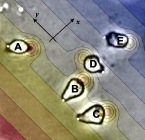 Course Mechanics
Course Mechanics 
 Course Mechanics
Course Mechanics 
![]()
|
Navigation bar |
This class is an active learning experience! Think "aerobics class" rather than "watching a good science program on TV"! In all parts of the class you will be engaged in thinking about, talking about, figuring out, and learning physics. ReadingsThere are readings in this class, but we have chosen not to use a standard text. In part this is because there is no standard introductory physics text that is really written for biology students. Our goal is to start with what you know from introductory biology and chemistry -- and your everyday experience! -- and teach you the physics that is most relevant for understanding living things. We are in the process of writing such a book as an online wiki-book. Before each class there will be a few (fairly short) web pages for you to read and comment on (using Mastering Physics). Here are your pre-lecture tasks: Reading assignments (and it is on the navigation bar). ClassesThe "lectures" will typically begin with a brief recap of the content of the previous night's reading and a discussion based on the questions you and your classmates have entered. The rest of the class will be group problem solving, demonstrations and discussions, and other activities. RecitationsThe recitation sections will be group problem solving. Typically, you will work through an extended multi-part problem often with a biological context. |
The laboratories in this class will let you experience and explore the topics of lecture and recitation in the real world. You also will learn techniques that are directly applicable to living things, for example how to characterize the motion of an object moving under a microscope.
The lab experiments are different from the traditional "protocol" labs where you are told exactly what to do and expect to get a result that agrees with some theoretical prediction. These are design labs -- labs in which your job is to design and carry out an experiment to answer a question.
Each lab experiment will be carried out over two or more weeks to give you time to learn a new technique and to answer a question. An important part of the lab is a discussion at the end where you present and discuss your results to the other members of your class.
Lab reports will be done during the lab periods and handed in before you leave the final lab period of an experiment. For more details and for the lab handouts, go to our Lab page.
In addition to the reading commentaries there will be three weekly homework assignments. Weekly homeworks are due on FRIDAY at the beginning of lecture. The homeworks are specified on the Homework assignments webpage each week. Some of it will be completed in the MasteringPhysics (MP) environment and some on paper.
You will get limited feedback from the grader on the last two. Solutions to these problems will be posted on BlackBoard. You will need to go over those solutions carefully and compare to what you have done to be sure you understand.
Homework and in-class problem solving is where most of the learning in this class gets done! Do a careful and complete job on your homework. If you are not earning full credit and looking at the solutions doesn't help you for next time, check with an instructor and go over what more you need to do.
We will have (graded) 10-minute quizzes at the beginning of class on each MONDAY when we are not going over an exam. Quizzes will focus on important -- and sometimes subtle fundamental issues (often from the previous week's material). Each quiz will be worth 10 points. The point of these quizzes is to help you see where you might still be confused. There will be 11 quizzes. The lowest grade will be dropped.
We will have two hour exams and a final. Each exam will test how well you have learned to use and make sense of the material. As a result, you will be expected to think on exams. Each exam will include (points approximate): one set of short answer or multiple choice problems (25 pts -- often connected representation translation problems), two multi-part problems (25 pts each -- problem solving), one estimation problem (15 pts), and an essay question (10 pts). Although exams are important, they total only ~40% of your total class points -- and there are ways to improve your result after the fact. See our Grading page for the rules for regrades and makeup exams.
If you have a valid excuse for missing an exam, quiz, or homework, send an email to your instructor to arrange what to do about it, beforehand if at all possible. Specify the date and day you will be (or were) absent and the reasons. Ex post facto (after the fact) excuses will require validation and may not be acceptable. (Wanting to leave early before a holiday is NOT a valid excuse, even if it's for a friend's wedding.) You must contact your lead instructor. Your TA does not have the authority to excuse you from any required class activity.
![]()
This page prepared by
Edward F. RedishLast revision 25 August, 2012.